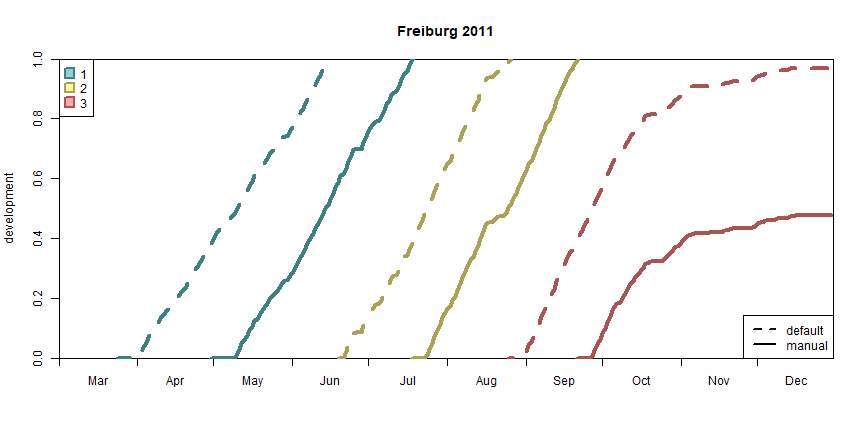barrks offers multiple ways of model customization. The
parameters of a model can be modified and individual submodels can be
combined to create a new model. Furthermore, it is possible to create
phenological events (such as onset, diapause and mortality) manually to
apply a model with observed or arbitrary data. This vignette illustrates
the corresponding procedures and compares the respective outputs with an
unmodified model.
library(barrks)
library(tidyverse)
library(terra)
# function to unify the appearance of raster plots
my_rst_plot <- function(rst) {
plot(rst, mar = c(0.2, 0.1, 2, 5),
axes = FALSE, box = TRUE, nr = 1,
cex.main = 1.9, plg = list(cex = 1.8))
}
data <- barrks_data()
# calculate phenology without modification for comparison
pheno_std <- phenology('phenips', data)Modify and combine models
To modify parameters of individual models the new values should be
passed to model(). In this example PHENIPS is customized by
setting the daylength threshold for the diapause submodel to 14 hours
(default are 14.5 hours). The parameters available for customization are
found on the model customization manuals which are listed at the
model() manual.
To combine individual submodels, model_combine() is
used. As parameters, the individual models are listed. To combine a
model with a specific submodel, pass a list with the keys
model and submodels. In the example PHENIPS is
combined with the diapause submodel of PHENIPS-Clim.
To compare the model outputs, the prevailing generations for all calculated models are plotted on four different dates.
# calculate phenology with a customized model
model_custom <- model('phenips', daylength_dia = 14) # `daylength_dia` is 14.5 by default
pheno_custom <- phenology(model_custom, data)
# calculate phenology with a combined model
model_combined <- model_combine('phenips',
list(model = 'phenips-clim',
submodels = 'diapause'))
pheno_combined <- phenology(model_combined, data)
# plot generations
dates <- c('2015-04-15', '2015-06-15', '2015-08-15', '2015-10-15')
get_generations_rst(pheno_std, dates) %>% my_rst_plot()
get_generations_rst(pheno_custom, dates) %>% my_rst_plot()
get_generations_rst(pheno_combined, dates) %>% my_rst_plot()
Generations calculated by PHENIPS without modifications

Generations calculated by customized PHENIPS

Generations calculated by PHENIPS combined with diapause submodel of PHENIPS-Clim
Create onset, diapause or mortality events manually
To create phenological events manually, create_onset(),
create_diapause() and create_mortality() are
used. These functions return multi-layer SpatRasters that can be used as
.onset, .diapause or .mortality
parameter for phenology(). For instance, this practice can
be used to implement personal observations.
As an example, PHENIPS-Clim is applied on the station data delivered
with barrks and the onset is set to May 1st. The results
are plotted in a development diagram without sister broods to keep it
simple.
# calculate phenology without modification for comparison
pheno_std <- phenology('phenips-clim', barrks_data('stations'))
# calculate phenology with a manually created onset
onset <- create_onset(barrks_data('stations'), c(Freiburg = yday('2011-05-01')))
pheno_manual <- phenology('phenips-clim', barrks_data('stations'), .onset = onset)
# plot for comparison
plot_development_diagram(list(default = pheno_std, manual = pheno_manual),
xlim = as.Date(c('2011-03-01', '2011-12-31')),
.generations = prop_filial_generations(pheno_std),
.lty = c(2, 1),
.lwd = 4,
.legend_lty = list(lwd = 2),
.group = FALSE)
Development diagram of PHENIPS-Clim with and without a manually created onset